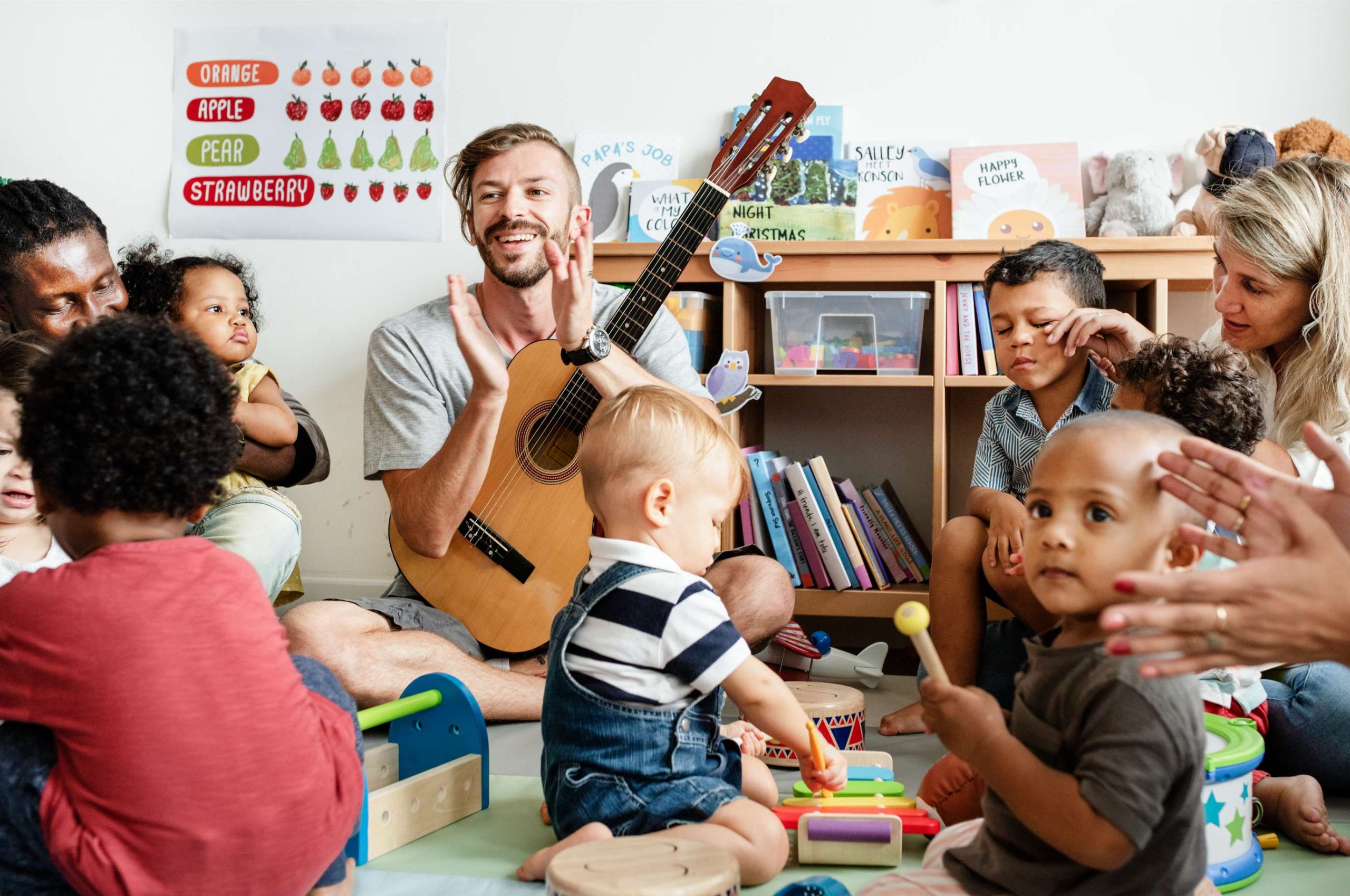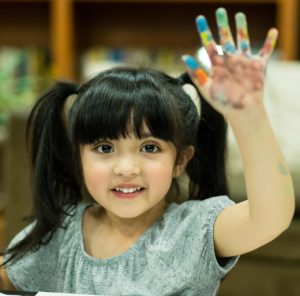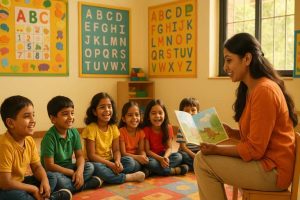From soothing lullabies sung to newborns to joyful nursery rhymes sung by preschoolers in classrooms, music has always been the connecting thread between emotion, memory, and learning. For preschool children, music isn’t merely a source of joy, it’s a powerful tool shaping the very architecture of their developing brains. The Impact of Music for Preschoolers goes far beyond entertainment; it builds the foundation for learning, creativity, and emotional growth.
The Science Behind Music and Early Brain Development
The preschool years represent a symphony of growth in a child’s brain, with over a million new neural connections being created every second. Music plays a deeply formative role in this dynamic process. Neuroscientific research reveals that multiple regions of the brain particularly the auditory cortex, motor cortex, hippocampus, and prefrontal areas are activated when children engage with music. These areas cooperate to process rhythm, melody, language, and movement.
When a preschooler claps, hums, or dances, different brain regions communicate simultaneously, strengthening neural pathways that support memory, attention, emotional regulation, and language comprehension.A 2016 study by the University of Southern California’s Brain and Creativity Institute discovered that children involved in music training demonstrated accelerated growth in both their auditory system and fine motor coordination. Simply put, their brains were growing stronger through rhythm and song, reinforcing the profound impact of Music for Preschoolers on cognitive development.
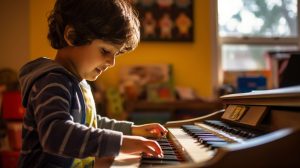
Music and Language Development: A Natural Harmony
Language and music share an intrinsic bond both depend on rhythm, tone, and timing. Singing nursery rhymes like “Twinkle, Twinkle, Little Star” or “Old MacDonald Had a Farm” nurtures phonemic awareness, a critical foundation for reading and early literacy.Repetition of lyrics allows children to practice pronunciation, vocabulary, and sentence recognition, helping them grasp complex language structures later on.
Many modern preschools integrate music-based learning into literacy programs because they recognize the impact of Music for Preschoolers on language skills. Rhyming songs, rhythm clapping, and call-and-response singing not only make learning enjoyable but also encourage self-expression and communication confidence.
Improving Memory, Concentration, and Emotional Intelligence
Children can easily remember the lyrics of their favorite song but struggle with memorizing a random list of words because music stimulates emotional and sensory memory.When preschoolers learn songs, both hemispheres of their brain work together the left hemisphere processes words, while the right hemisphere interprets melody and emotion. This integration enhances focus, problem-solving, and long-term memory.
Moreover, music nurtures emotional intelligence. Happy, upbeat songs trigger dopamine release of the “feel-good” neurotransmitter boosting motivation and joy. Gentle melodies, on the other hand, help calm anxiety and promote emotional balance. These soothing effects are another testament to the lasting impact of Music for Preschoolers on emotional development.
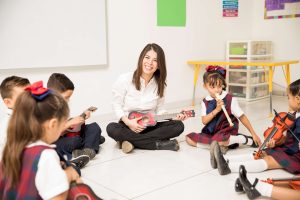
The Role of Rhythm and Movement
Preschoolers are natural movers and rhythm-makers. When they march to a drumbeat or sway to music, they are not just having fun, they are refining motor coordination and spatial awareness.Rhythmic movement synchronizes the brain and body, improving balance, timing, and physical control. Even simple actions like tapping to a beat or shaking maracas strengthen skills linked to mathematical reasoning and sequencing.
That’s why music and dance are integral to preschool learning, they connect physical activity with mental growth, showing the incredible impact of Music for Preschoolers on overall development.
Music as a Gateway to Creativity
Music is imagination set to rhythm. For preschoolers, it opens a universe of creative exploration letting them express thoughts, feelings, and stories through song and movement.When children invent lyrics, make rhythms with classroom objects, or compose simple melodies, they engage in symbolic thinking representing one thing (a sound or movement) as another idea. This ability later supports creativity in art, storytelling, and problem-solving.
In a rapidly changing world that values innovation, the impact of Music for Preschoolers becomes even more vital. It cultivates originality, adaptability, and curiosity, traits that tomorrow’s thinkers will depend upon.
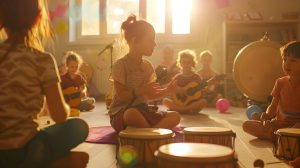
Social Connection Through Music
Group singing and musical play promote empathy, cooperation, and a sense of belonging. When children sing or dance together, they learn to listen, take turns, and respect others’ space.
Music creates emotional synchrony, a shared rhythm that aligns moods and fosters connection. That’s why preschool classrooms often echo with laughter, claps, and joy during group songs. These experiences lay the foundation for emotional intelligence and teamwork, both essential life skills.
Music and Academic Readiness
Music isn’t just playtime, it’s preparation for lifelong learning. Studies from Harvard and Stanford have shown that consistent engagement with music enhances spatial-temporal reasoning and the ability to understand patterns, sequences, and abstract relationships.
Counting songs and rhythmic storytelling naturally boost numeracy and comprehension. So when preschoolers sing “Five Little Ducks” or “The Ants Go Marching,” they’re unknowingly building mathematical and linguistic foundations.Such findings highlight the measurable Impact of Music for Preschoolers on academic readiness a fun, engaging way to prepare their brains for more structured learning.
Music and Emotional Well-being
Preschoolers experience a whirlwind of emotions daily joy, curiosity, frustration, excitement. Music provides a safe, expressive outlet for these feelings.A soft lullaby soothes a restless child, while an energetic rhythm can uplift a sleepy classroom. Teachers often use musical transitions like “clean-up songs” or “circle time tunes” to structure activities and make routines enjoyable.
This predictability fosters a sense of security and helps children navigate their emotions, another subtle yet powerful Impact of Music for Preschoolers that shapes emotional resilience.
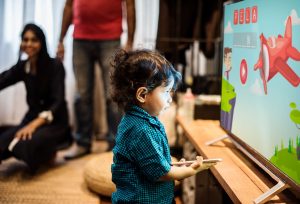
Kids Kingdom Preschool: Where Music Meets Early Learning
At Kids Kingdom Preschool, music isn’t just part of the curriculum, it’s woven into every moment of the learning journey.Classrooms resonate with laughter, rhythm, and creativity, reflecting the school’s belief that music is the heartbeat of learning. Every child is encouraged to explore sound, movement, and self-expression.
Interactive sessions with instruments, action songs, and dance routines help children develop language skills, creativity, and confidence. From morning welcome tunes to vibrant music parades, Kids Kingdom ensures every little learner experiences the joy and developmental benefits of music.Parents often share how their children return home humming tunes, tapping rhythms, or teaching family members new songs a clear reflection of active learning through music.
Through its thoughtfully designed programs, Kids Kingdom Preschool blends music, play, and holistic education, fostering a nurturing space where young minds can truly thrive.
The Growth Melody
William Shakespeare once wrote, “The man that hath no music in himself… is fit for treasons, stratagems, and spoils.” Though he spoke of men, the sentiment resonates even more for children.Music awakens curiosity, empathy, and imagination, the very essence of being human. Just as a seed responds to sunlight, a child’s brain blossoms in response to melody. With every note, rhythm, and rhyme, an invisible structure of intelligence and emotion is built.
Through music, children learn not only how to listen but how to feel, connect, and grow, the truest testament to the Impact of Music for Preschoolers on shaping future generations.
Final Notes
For preschoolers, music is far more than a pleasant sound,it’s a bridge between emotion and intellect, play and learning, creativity and discipline. From improving brain development to boosting memory, language, and emotional balance, the impact of Music for Preschoolers is transformative.
When parents and educators nurture a child’s musical environment singing, dancing, and listening together they gift them the rhythm of lifelong learning.So, the next time you hear a child singing off-key or tapping endlessly on a table, smile you may just be witnessing their brain composing its first symphony of growth.


